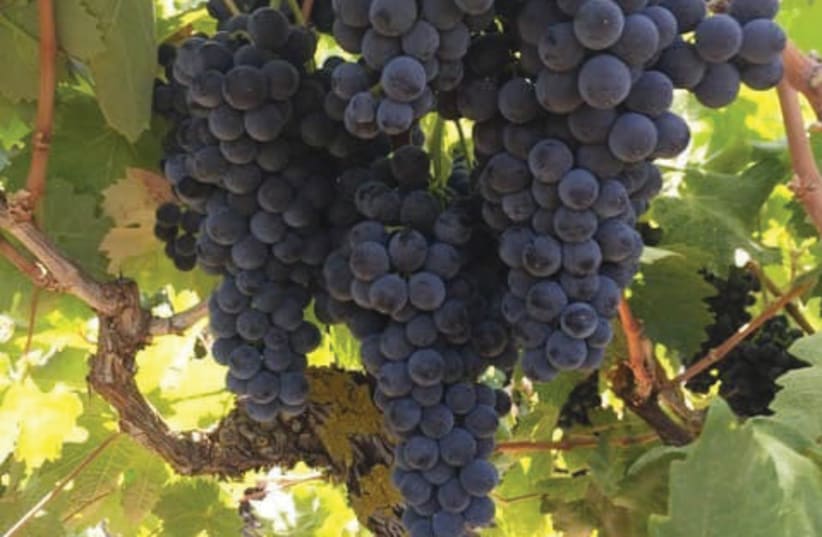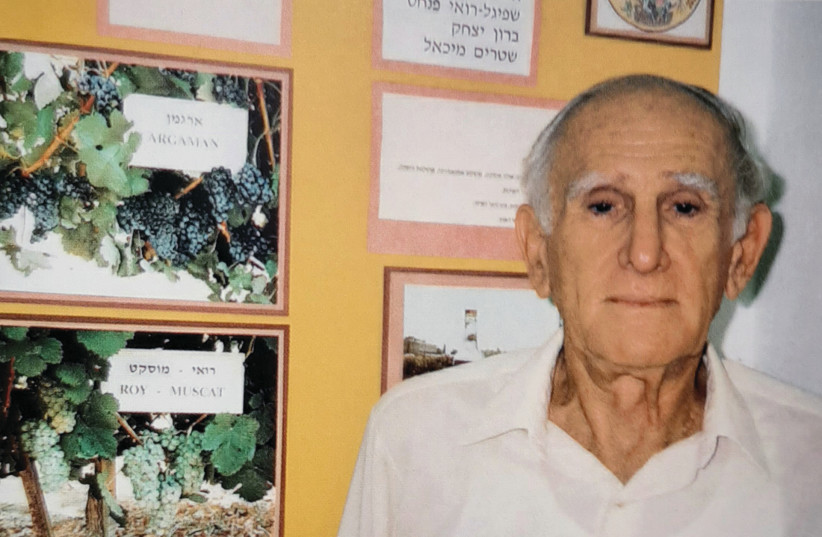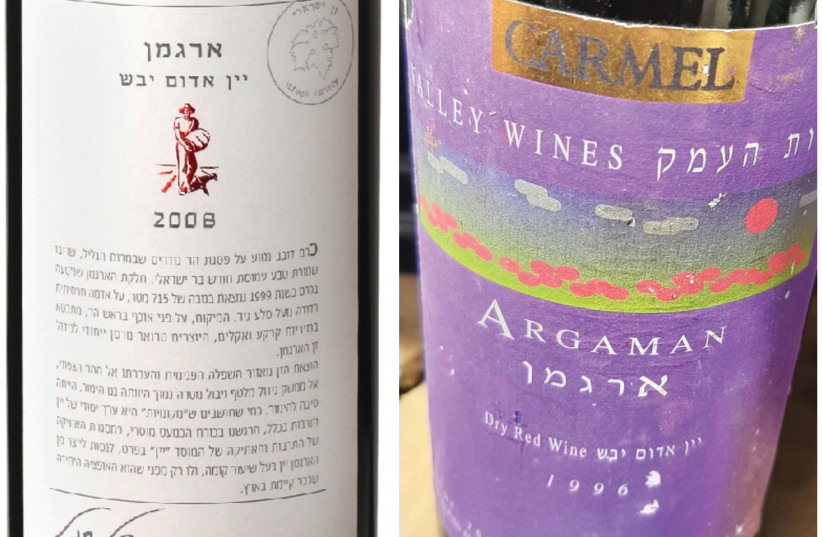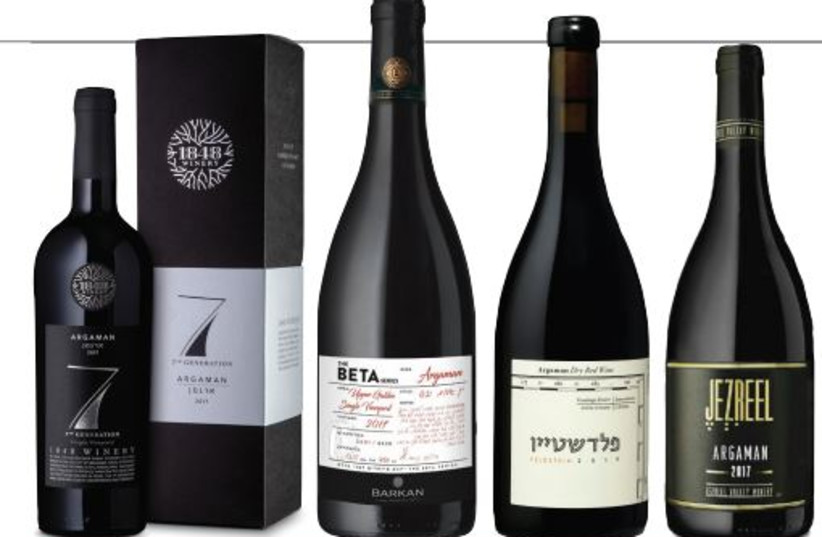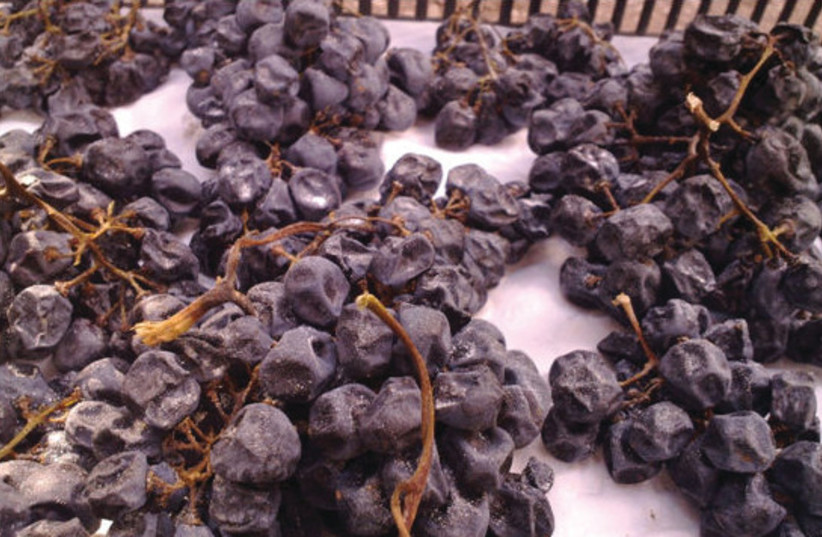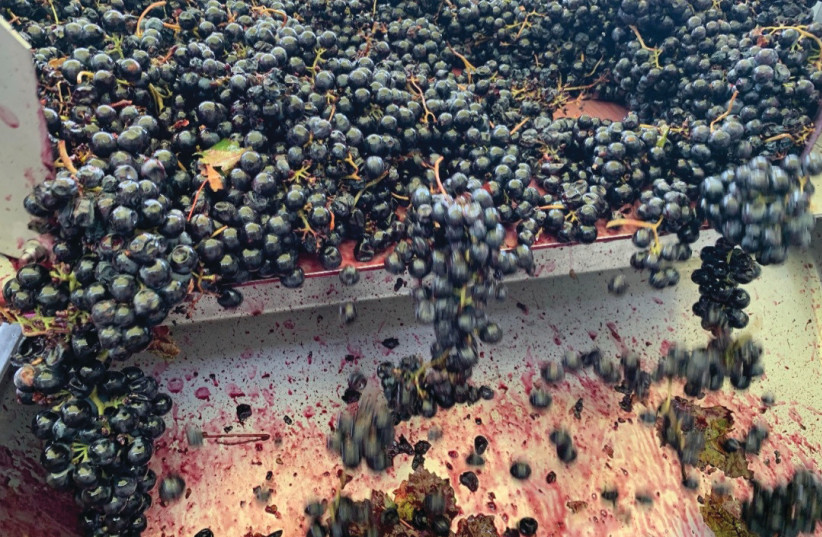Some critics say there is an international sameness about Israeli wine. We produce wines in the main, from the same varieties grown in most wine-producing countries. There is nothing original or unique about drinking yet another Cab, Merlot or Syrah from Israel. We do have some local ancient native varieties like Dabouki and Marawi, but these are made in such minuscule quantities. For those seeking a truly Israeli expression, help is at hand. Wake up and smell the Argaman!
Argaman is the sixth-most planted red grape variety in Israel. Originally, the purpose of this variety was modest. It was not intended to be seen so much but to be used more as a workhorse grape in blends. Last year, Argaman was catapulted to the forefront by some groundbreaking results in the Decanter World Wine Awards and the Challenge International du Vin. So maybe we should look at this variety with new eyes.
The story began with Carignan, which was brought to Israel by the Mikveh-Israel Agricultural School in the 1870s. This was even before Baron Edmond de Rothschild planted French varieties all over, and it has remained the backbone of Israeli wine ever since. It was at its peak in the 1970s, when more than 50% of the grapes grown in Israel were Carignan. Even today, it still remains the second-most planted variety after Cabernet Sauvignon.
A taste of Israel in wine
In the days when quantity was the only objective, the Carignan was over-cropped, and it did not provide wines of concentration and color. Indeed, it was used for blends, Kiddush wine and grape juice. The powers that be wanted to bring a blending grape that would provide more color.
So, in the 1970s, the Israel Wine Institute, led by Charles Loinger, a Frenchman from Strasbourg, decided to introduce Petite Sirah for that purpose. (It was brought to Israel along with Colombard and Emerald Riesling. Emerald Riesling was to become in its time, the largest selling wine, and Colombard the most planted white variety.)
At the same time and for the same reason, Professor Roy Spiegel, of the Volcani Institute, was working on his own creation. The Volcani is the research arm of the Ministry of Agriculture. Spiegel came up with a cross between Carignan, with the Portuguese variety Souzao, which comes from the Minho region of northeast Portugal. Souzao is also sometimes used in the blend of port.
On a visit to Vinho Verde country, I was fortunate to find a Souzao varietal wine because they are pretty rare. It was very deep colored, very sharp, with a slightly coarse taste. One could understand why it is chiefly used in blends.
Spiegel named his new variety Argaman, which appears in the Bible and translates to “purple” or “crimson.” His hope was that it would eventually replace Carignan. (Spiegel’s other, lesser-known cross, was between Muscat de Frontignan (Canelli) and Dabouki. This variety was named after him and called Roy.)
Argaman was planted in the volume vineyards of the coastal region, including Zichron Ya’acov, Judean Plain and Judean Foothills, but was mainly used as a silent blender. When the legendary wine critic Daniel Rogov was asked about the benefits of the variety, he answered: “Three things: Color, color and color!”
“Three things: Color, color and color!”
Daniel Rogov
The first varietal that was actually named Argaman was produced by Carmel Winery under their Emek (Valley), entry-level label. The first international medal received was for the Carmel Valley Argaman 1996, which won a silver medal at the Beverage Tasting Institute in Chicago.
However, Carignan, far from disappearing, went through a quality revival. In the early 2000s, winemaker Assaf Paz led a revolution, particularly at Carmel and Vitkin wineries. He identified the potential of existing Carignan and Petite Sirah vineyards, previously used for grape juice or inexpensive blends.
By lowering yields and starting with the express objective of making quality wines, the ugly ducklings were turned into swans. Carmel and Vitkin started producing some truly fine Old Vine Carignans and Old Vine Petite Sirahs. Later, Recanati Winery took up the baton as well.
THE FATHER figure of quality Argaman was Avi Feldstein, the poet-philosopher-winemaker of Segal Wines. He saw the humble Argaman in a new way. So, he decided to give it a chance by treating it as a quality variety with unfulfilled potential.
First, he planted it in the high-elevation Dovev vineyard in the Upper Galilee, and then gave it the care and attention of a quality wine. Creatively, he fermented his Argaman on the skins of Merlot grapes to provide more tannin, aroma and flavor.
The Segal Rechasim Argaman 2006 was the result. It was the first quality Argaman wine. Third party recognition followed. The 2008 Segal Argaman won a Gold Medal at the Challenge International du Vin in Bordeaux! Israeli wine folk sat up and took notice for the first time.
In 2012, a start-up winery was established called Jezreel Valley Winery. It was founded by Jacob Ner-David and Yehuda Nahar, the musical singer-songwriter-winemaker. The winemaking consultant was the respected Californian Ari Erle. They decided to focus on what I call “Israel’s adopted variety” – Carignan and Israel’s very own variety Argaman.
By focusing on more unfashionable varieties, they thought they would have a better USP (unique selling point) and be loyal to their vision of producing “more Israeli” wines. The winery successfully carved its own place in an overcrowded market and achieved high scores, particularly for its prestige Icon wine and its Carignan.
Furthermore, the winery became regarded as the “Argaman specialists.” Toward the end of 2021, its Jezreel Argaman 2019 took a giant leap forward, when scoring a first-ever 93 points on the important website: jamessuckling.com.
However, in 2022, the variety really came of age. It may become known in Chinese New Year style as “The Year of Argaman.” First, the 1848 Winery won a Gold Medal for its 7th Generation Single Vineyard Argaman 2017 at the very prestigious Challenge International du Vin in Bordeaux, emulating Feldstein’s success so long before.
The 1848 Winery Argaman is grown at Ramat Sirin in the Galilee, where the soil is basalt stone and volcanic, similar to the Golan Heights. 1848 Winery was founded by Yossi Shor in 2006. He is the eighth generation of the Shor family, which founded Israel’s oldest existing winery in the Old City of Jerusalem in 1848. The winemaker is French-born, Bordeaux-trained Ilan Assouline, and its consultant agronomist is Pinny Sarig, regarded as one of Israel’s most experienced and leading viticulturists.
Secondly, the Jezreel Argaman succeeded in being listed in a succession of Michelin-star restaurants in France. This was partly due to good work by the importer, Eden Wine & Spirit, and, no doubt, the quality of the wine. But it was also because Argaman represented something unique and authentic that could not be duplicated in any other wine-producing country.
Jezreel Valley Winery has two Argaman vineyards, both in the northern Coastal Plain. The main one is Givat Nili, which is an old vine vineyard, nearly 50 years old. Here Argaman is grown in bush vines. The other is near Zichron Ya’acov.
HOWEVER, THE most striking recognition of Argaman came in the Decanter World Wine Awards 2022. This is the largest and arguably the highest quality competition in the world. Numerous Israeli wineries, large and small, sent in their wines for evaluation.
Three of the five leading, highest scoring Israeli wines in the competition were made from Argaman! These were the Jezreel Argaman 2017; Barkan Beta Argaman 2019; and the 1848 Winery Single Vineyard, 7th Generation Argaman 2018 (the next vintage after the Bordeaux Gold Medal-winning wine).
The star was the Jezreel Argaman 2017, which won a gold medal and scored 96 points. This was the highest score of any Israeli wine. Kudos to Jezreel Valley….and Argaman! The tasting notes read: “Deeply colored, near black, inky wine full of sweet, ripe black fruits, red fruits and cassis. This wine has a silky texture, ripe, fine grained tannins…..the long finish gives plenty of time to reflect on this little-known Israeli grape.”
The best buy of the competition (my description, not Decanter’s) was the Barkan Beta Argaman 2019, which also won a gold medal and scored 95 points. Only two Israeli wines won golds, and they were both varietals of Argaman!
Barkan Winery is Israel’s largest winery, which is owned by Tempo Beverages. Beta is their label for “on-premise” restaurants, and their wines are mainly found on Tel Aviv and Jerusalem wine lists. Confusingly and inexplicably, they sell their Argaman under different labels and brands in different countries. It is Barkan Beta in Israel, Barkan Classic in the United States, and Segal Levant in the United Kingdom.
Whatever the label, their Argaman comes from the Judean Foothills, at the point where the altitude rises sharply to become the Judean Hills, on the way to Jerusalem. The winemaker is the Master of Wine (only the second in Israel) Ido Lewinsohn, who is one of our most inventive and creative winemakers. He really believes in Argaman.
As for Avi Feldstein, he now has his own Feldstein Winery, situated in the Dalton Industrial Estate. As such, one of the pioneers of the Upper Galilee in the 1990 has returned to the Upper Galilee. He had last produced an Argaman in the 2015 vintage but has now returned to Argaman by releasing a 2019, produced from an Upper Galilee vineyard.
Again, he is inventive, squeezing the maximum from this variety. Half the fruit is sun-dried, appassimento style, to extract more flavor, while the rest is fermented whole cluster to maximize the fruit character. Feldstein believes it is his duty as an Israeli winemaker to produce the most Israeli wine possible. This explains his determination to work with both Argaman and Dabouki, which is the most Israeli of the Holy Land native varieties.
What are the characteristics of Argaman?
For me, the variety has a deep, hearty color; the aromas are of cherries and raspberries; tannins are soft; and the wines have a peppery character. Most notable may be the very refreshing acidity, a good characteristic for our climate.
Patriotic wine lovers, here is a 100% Israeli variety winning awards and gaining international recognition that any self-respecting Cabernet would be pleased to receive! When you see Argaman on the label, you know it can only come from one place. For those that need it spelled out, Argaman is the red grape variety that is most Blue and White!
The writer is a wine industry insider turned wine writer, who has advanced Israeli wines for 35 years. He is referred to as the English voice of Israeli wine. www.adammontefiore.com
